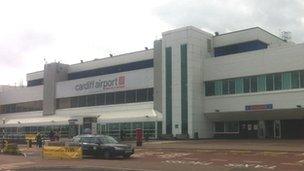Cardiff Airport deal: New flights 'key to success'
- Published

The Welsh government wanted to buy Cardiff airport after a slump in passenger numbers
Attracting more flights to Cardiff airport is essential if it is to be a success under Welsh government ownership, its new chairman says.
The troubled airport has been bought by the taxpayer for £52m after the number of passengers halved to just over a million in the last five years.
Lord Rowe-Beddoe, chairman of the new airport board, said it would be working to attract new airlines.
The first minister says he hopes for transatlantic flights in the future.
Announcing the deal on Wednesday, Carwyn Jones insisted it would not be operated by the government and would be managed "at arm's length" and "on a commercial basis".
Lord Rowe-Beddoe - who was the former chairman of the Welsh Development Agency - said extensive research had been carried out about how best to halt the decline in the airport.
"We do have access problems," he told BBC Radio Wales.
"We will be looking at that and improving the customer experience with the facilities of the airport. And most of all getting airlines to use it again."
On Wednesday, Mr Jones said the short term aim of the Welsh government was to increase the number of people using the airport but that there were more ambitious plans in the longer term.
"In the longer term I think the airport is actually very well placed in terms of long-haul traffic," he added.
John Borkowski, a former head of strategy at British Airways, on the challenges for the airport
"If, for example, as we think will happen Heathrow just gets more and more clogged and nothing is done about it, no new runway, then there will be an opportunity for an airport in the western part of Britain to act as a new transatlantic gateway for example in the longer term.
"That's something we're very much looking at."
However, John Borkowski, a former head of strategy at British Airways, said he was "not awfully optimistic" about attracting long-haul flights to the airport.
He said in the short term it was essential to attract more airlines to fly from Cardiff and to improve the transport infrastructure around the airport.
But he said he did not believe Cardiff could compete with nearby Bristol Airport.
"I think the chances of Cardiff attracting a lot of traffic away from Bristol is not a very high prospect," he added.
"Bristol has got momentum behind it. It has got a lot of airlines operating there with quite a choice of flights and in terms of frequency and destination.
"It will never be easy to move those flights to Wales. But there are other options for Wales.
"There might be routes which are not served by Bristol and Cardiff could look at possibly trying to attract airlines from those areas.
"There's of course the other market which is the inclusive tours market, the non-scheduled market and again there may be opportunities for Cardiff to develop flights in that area."
Bristol's concerns
Alun Cairns, MP for the Vale of Glamorgan, said he believed the Welsh government could have done a lot more to support the Rhoose-based airport without actually buying it.
"There are several examples where the Scottish government supported Emirates to go to their airports and the North East Regional Development Agency, when that existed, supported Emirates to go to their airport," he said.
"And the Welsh government refused to support Emirates to come to Cardiff, which really would have opened up the Middle East and the Far East and Australasia."
Rival airport Bristol has raised concerns that Cardiff would unfairly benefit from state support.
But the deal has been welcomed by organisations representing Welsh business, with the consensus being that a thriving airport would be good for the economy.
The airport's existing staff will remain as part of the purchase but only 40 are employed directly.
An average of around 1,000 staff work on the site as sub-contractors but that figure can vary considerably.
- Published27 March 2013
- Published25 January 2013
- Published24 January 2013
- Published9 January 2013
- Published19 December 2012
- Published18 December 2012
- Published18 December 2012